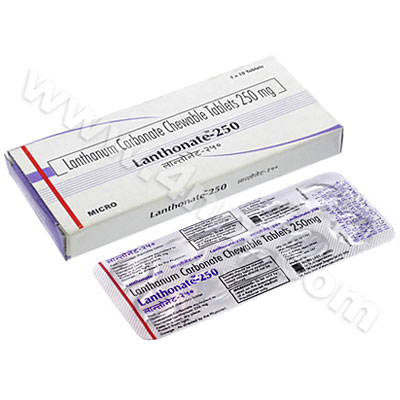 |
Home  Generics Generics  Lanthonate (Lanthanum Carbonate) Lanthonate (Lanthanum Carbonate) |
|
|||||||||
|
Lanthonate (Lanthanum Carbonate)
What is Lanthonate (Lanthanum Carbonate) used for? Lanthonate (Lanthanum Carbonate) is given to patients with kidney disease or those who are on dialysis. This drug helps to reduce the levels of phosphate in the blood by preventing phosphate from being absorbed from food in the stomach. By decreasing phosphate, it can help to prevent bone problems and reduce the risk of heart disease or strokes. How should I use Lanthonate (Lanthanum Carbonate)? Lanthonate (Lanthanum Carbonate) chewable tablets should be taken orally together with food or straight after eating, or as directed by the prescribing physician. These tablets should be chewed and then swallowed. Do not swallow them whole. Your physician may start you out on a low dosage, which may then be increased. Always follow the instructions of your physician. What are the side effects of Lanthonate (Lanthanum Carbonate)? When Lanthonate (Lanthanum Carbonate) chewable tablets are given to patients with kidney disease, some side effects may occur, such as:
In case you suffer from changes in behavior or muscle weakness, you should immediately see your physician. In rare cases this drug has been known to cause serious blockages of the bowels. If this happens, surgery or a visit to the hospital may be required. Patients who have a history of stomach problems are at an increased risk of this occurring. Consult your physician immediately if you notice persistent pain in the stomach, severe constipation or vomiting that persists. Please Note Strictly follow all instructions provided to you by your physician or pharmacist while using Lanthonate (Lanthanum Carbonate). Optimum and safe dosage can differ based on the patient and the condition being treated. As this medication may be unsafe for certain patients, it is essential you always inform your physician if you are pregnant or breastfeeding, as well as if you have any allergies, other illnesses, or ongoing health conditions, and if you are taking any other form of medication, supplements, or herbal products. Immediately seek emergency medical care if you have any allergic or hypersensitive reaction. Common signs of a reaction include hives, swelling, skin rashes, chest pains, as well as trouble breathing or swallowing. 
|
|||||||||||||||||